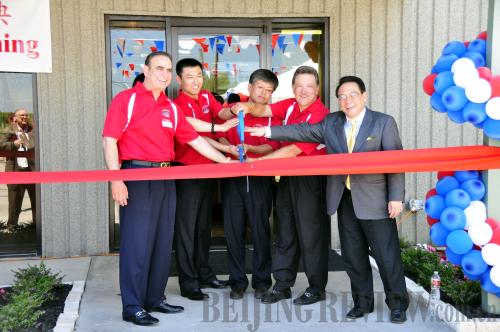|
 |
|
GOING GLOBAL: Jinhuan Steel Structure Engineering Co. Ltd., a steel manufacturing company in Hebei Province, and Rigid Building Systems, a Houston-based steel building company, open their joint venture Rigid Global Buildings in Houston on April 1, 2011 (CHEN RUWEI) |
China's outbound direct investment (ODI) has recently experienced a surge as Chinese companies set their eyes overseas. By the end of 2010, China's ODI in non-financial sectors had totaled $258.8 billion. In 2010 alone, ODI in non-financial sectors grew 36.3 percent to reach $59 billion. Mei Xinyu, an associate research fellow with the Chinese Academy of International Trade and Economic Cooperation, said in an article for Beijing Review China should cool down its overseas investment fever because of the hidden risks brought by soaring ODI. Edited excerpts follow:
China has become one of the most prominent countries in the international direct investment market in recent years. With the efforts the Chinese Government has made in pushing its capital abroad, more and more countries are accepting investment from China, even in developed countries which used to be skeptical politically toward China.
But I suggest the Chinese Government should slow down or stop incentives for ODI, because of the hidden risks it presents to China.
Reasons
Setting an overly optimistic ODI target is unrealistic, especially with ODI in the resources mining sector. According to the 2009 Statistical Bulletin of China's Outward Foreign Direct Investment published by the Ministry of Commerce, among the top six sectors that attracted the most ODI from China by the end of 2009, mining ranked third with ODI in the sector reaching $40.58 billion and accounting for 16.5 percent of the total. Projects in the mining sector are always large-scale. China's booming ODI in this sector is considered a result of its attempt to secure resources and lower the price of imported resources. But this goal can't be realized simply through ODI.
Overseas mining ownership cannot ensure resources supply in time of war—only a strong army and navy can do that. If foreign companies can freely manipulate transfer pricing at the host country, Chinese manufacturers can lower its importing costs by investing in overseas resource companies. But most countries with a certain level of economic and social development, especially developed countries, have varying restrictions on transfer pricing of foreign companies. For example, Chinese companies have been approved to invest in Australian mines in recent years, but the approval came with strings attached, the most important one being that China-invested mining exports to China must be sold at international market prices.
The surge of long-term and large-scale ODI projects will bring devastating risks due to many factors including the dearth of talent, faulty balance sheet structure and market fluctuations. Lack of qualified talent is the primary constraint for any country's large-scale ODI. Meanwhile, compared with domestic investment, overseas investment faces extra risks of interest and exchange rate changes. These changes may even put a country's balance of payment in danger.
Emerging countries' ODI have surged because of their continuous surplus in the balance of payment, the appreciation of their domestic currencies, and interest rate hikes resulting from overheating domestic economy. In these circumstances, strong domestic companies prefer borrowing foreign funds with lower interest rates and expected declines in the exchange rate of the denominated currency.
To support domestic companies' ODI, the government of the host country is often willing to loosen controls on borrowing foreign debt for enterprises. In recent years, China has allowed domestic parent companies to provide credit support for its overseas subsidiaries when the subsidiaries want to borrow money from the international financial market. But a large amount of ODI will cause a decrease in the surplus of the host country's capital account. When the production capacity is transferred abroad, it will also cause a decrease in the surplus of the host country's current account or even turn surplus into deficit.
The growth of ODI will gradually weaken the bases of an appreciating domestic currency and a high interest rate, both of which will reach a critical point. If international speculative money takes the chance to flood the market, the exchange rate and interest rate of the domestic currency will encounter sharp turns. When this happens, companies holding foreign debt will face rising interest rates, and the principal of the debt denominated in foreign currencies will be appreciated when exchanged into the domestic currency, making the debt a heavy burden of the companies.
|
